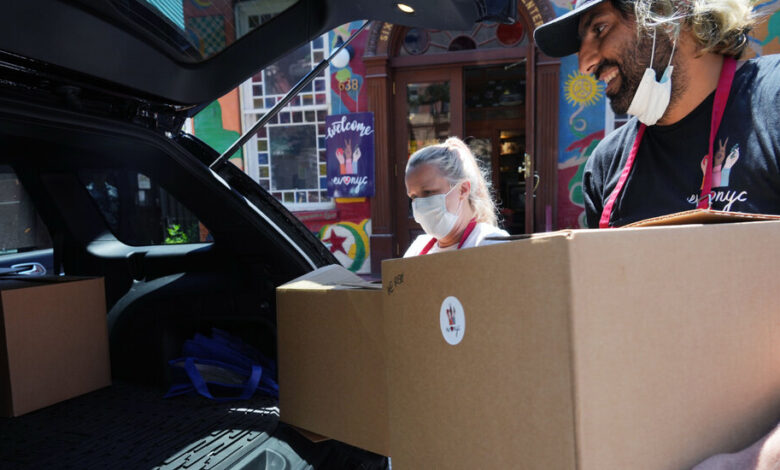How a Couple Who Started a Food Bank Spend Their Sundays

When the pandemic caused food banks to shut down in March 2020, two soup kitchen volunteers, Mammad Mahmoodi and Sasha Allenby, borrowed a baker friend’s kitchen to make hot meals for people in need.
That evolved into EV Loves NYC, a nonprofit that churns out 2,000 meals every Sunday from its headquarters at Sixth Street Community Center in the East Village of Manhattan.
The food is not typical soup kitchen fare. Every weekend, volunteers prepare dishes that reflect the cultural heritage of the chef in charge.
The meals are then packed into cars, vans, bike carts and backpacks to be delivered to New Yorkers across all five boroughs. Some 30 organizations, including aid groups, churches and mosques, help with the distribution.
Mr. Mahmoodi, 35, and Ms. Allenby, 49, both of whom have kept their full-time jobs despite the 40 hours a week they devote to EV Loves NYC, are also a couple. In March, they moved from the East Village to Bushwick, Brooklyn.
PRESHOW Mammad Mahmoodi: I wake up at 7 and start checking my messages, making sure everything is in place, like the huge amount of rice we use. I have to head out by 7:30 so I can get to the community center before 8, when volunteers start coming in. I never eat breakfast. One of the volunteers usually comes in with a bag of bagels or something from a local coffee shop. Sasha Allenby: I make a chocolate smoothie at home before I go into the fray. I get there around 9.
DIVISION OF DUTIES MM: On Sundays we have three shifts. The first shift is prepping and chopping and cooking. That’s 10 people. The second shift is actually dishing the food. That’s 15 people. The third shift is cleanup. That’s only five people. Before the kitchen people get there at around 8:30, I’m walking around helping set up. SA: When I get there, mainly I’m speaking with volunteers, making sure everybody is OK on a personal level. Since the start of the pandemic, we’ve had 1,400 volunteers come through our door. Out of those, 30 to 40 keep coming back and are deeply in love with the project. They’re our core.
RISING COSTS MM: The last six months, inflation has really impacted us. We buy everything wholesale, but it’s affected us radically. SA: Due to Mammad’s economic prowess, we had been making gourmet meals for 80 cents apiece. That same meal now costs $2.20.
ALMOST SEAMLESS MM: Our first and most important rule is that we make gourmet meals people are excited about. We’re food snobs. SA: It should be like a meal coming from Seamless. The same impact.
INTENTIONS MM: At 11:30, when the first shift ends and the second shift is starting, we do the standup. That’s where everyone gathers to say, “Hey, what is the significance of this food? What are we doing?”
PREP TO THE BEAT SA: Two to three times a month we have a volunteer D.J. that comes during the second shift. D.J. Tommy is our most frequent. When he comes in, the vibe in the kitchen is super high. It really does make a difference. MM: It’s funny: When we have a D.J., the efficiency and productivity skyrockets. SA: It makes people feel more connected.
THE REGULARS SA: In the afternoon people from the neighborhood drop in to pick up food. I spend time individually with them, making sure I’m building a connection. One lady is a larger-than-life character. She’s a poet. Sometimes she’ll write poetry for us or dance for us. That’s the kind of place it is. People feel welcome to come in and get a little bit of love and a little connection. The poet usually takes five or six meals. She doesn’t get any other hot meals during the week.
HOT STUFF MM: The food we’ve prepared goes to a lot of different organizations. But I’d say 400 to 500 of the 2,000 meals we make on a weekly basis go to unhoused populations. At around 5, volunteers from two or three mutual aids go to places where we know the unhoused population goes, like Chinatown and Washington Square Park. The food is put in heat bags, similar to what they pack pizzas in, so it’s hot for them.
LATE SHIFT SA: I’m there for cleanup. I’m not particularly a neat freak, but I’m very conscious that the community center is not our space. We rent it, so I want to be respectful and leave it better than I found it. MM: The last thing we do before we close up is yell, “Anyone here?” It started as a joke, but now it’s a tradition, like the closing bell. It’s a big community center. We want to make sure nobody fell asleep under the bench. SA: The prepared packages of food are lined up in the alley. Organizations turn up to pick it up.
SPENT MM: We go home on the L train. Long live the L train. SA: At home, we collapse. The labor and the amount of people we’ve communicated with and the amount of our hearts we’ve put into it cause us to collapse. MM: After a shower, I pass out. It’s the deepest sleep ever.
Sunday Routine readers can follow EV Loves NYC on Instagram and TikTok @evlovesnyc.